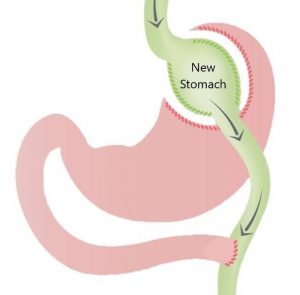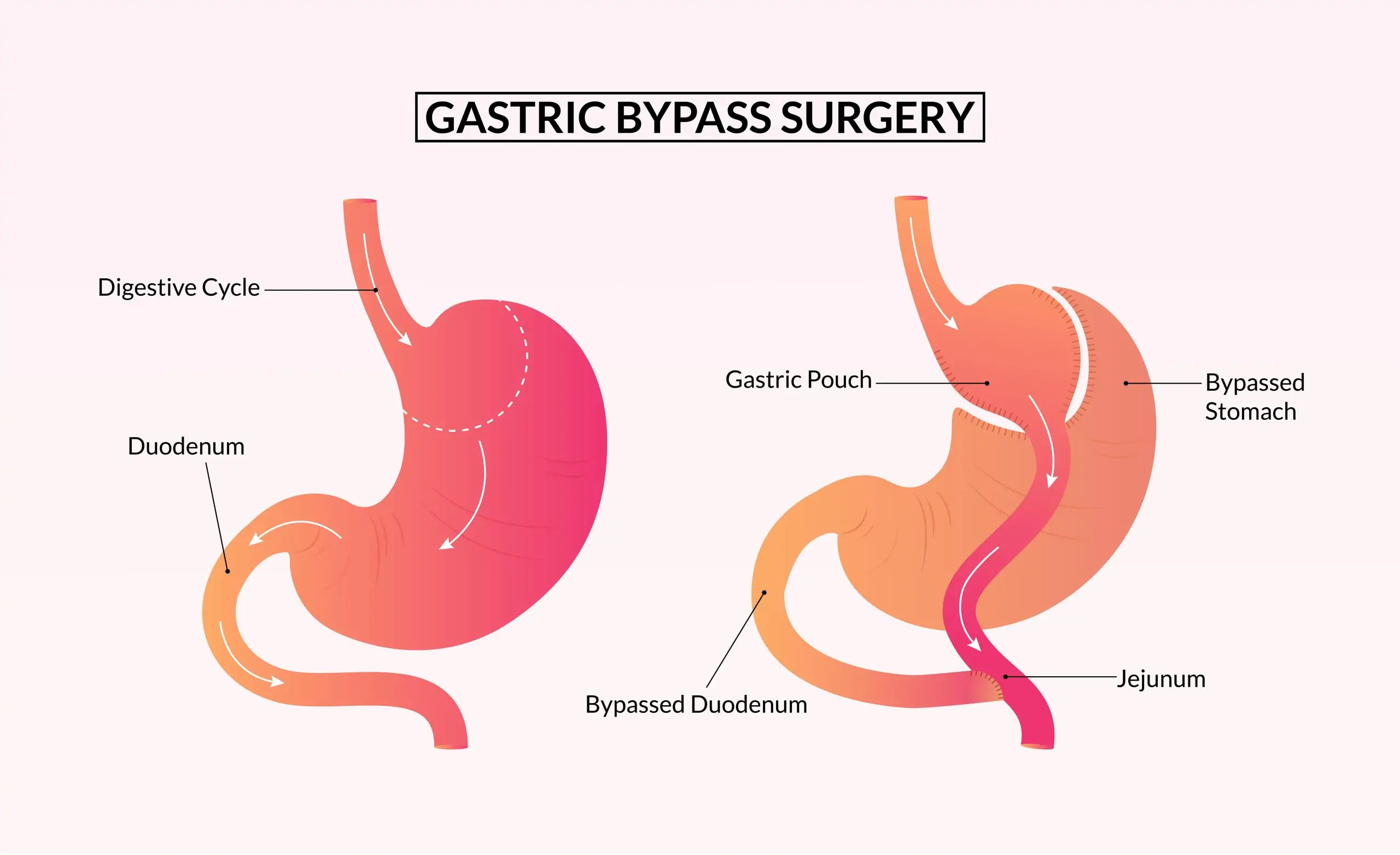Gastric Bypass Operation Details Istanbul Turkey |
||
|---|---|---|
 Accommodation 8 Days |
 Hospital Stay 2 Day |
 Operation Duration 2-6 Hours |
 Anaesthesia general anesthesia |
 Recovery Duration 7-10 Months |
 Follow Up Visit 7th Day |
Click Here For More Information |
||
WARNING The duration of treatment and trecovery time after the treatment may vary from patients to patients. The above information includes estimated values prepared for patients from abroad.
What is Gastric Bypass Surgery?
Gastric bypass surgery is a common weight-loss surgery and is one of the most frequently requested bariatric (obesity) surgeries. Gastric bypass surgery, known as stomach bypass surgery or bariatric bypass surgery, is created by a small pouch bypassing the stomach and anastomosed to the intestine by stitches. In most cases, this surgery is irreversible.
Gastric bypass aids weight loss by restricting the amount of food that enters the stomach. Thus, since the digested part of the body is reduced, the amount of nutrients and calories to be taken is limited. In addition, this procedure contributes to altering gut hormones, which will help you feel fuller for longer, suppressing appetite and reversing the metabolic syndrome caused by obesity.

Who can be a candidate for Gastric Bypass Surgery in Istanbul Turkey
In general, as with all bariatric surgeries, gastric bypass surgery may be a suitable option for you if you have the following characteristics:
- If you have a body mass index (BMI) of 40 or higher (extreme obesity)
- If you have a BMI of 35 to 39.9 (obesity) and a serious co-morbidity related to weight, such as type 2 diabetes, high blood pressure or severe sleep apnoea
- If you have not reached a healthy body weight despite following a medically supervised and long-term diet program
- If you have had gastric sleeve surgery and gastric band surgery before and have gained weight again after the procedure.
As in all bariatric surgeries, even if the above conditions are met for gastric bypass surgery, not everyone who is overweight may be suitable for this surgery.
In order to qualify for one of the weight loss surgeries, you must also meet the conditions in the medical guidelines. For this purpose, you should be aware that extensive medical screening tests will be performed and that the results of these tests should not prevent you from having surgery.
In addition, bariatric surgeries are expensive surgeries, and you must be willing to make permanent changes to maintain a healthier lifestyle and to follow long-term diet programs after surgery.
What are the Types of Gastric Bypass Surgery? How is Gastric Bypass Surgery Performed?

There are three types of gastric bypass surgery including Roux-en-Y (proximal), Roux-en-Y (distal), and mini gastric bypass:
-
Roux-en-Y (proximal) gastric bypass surgery:
This surgical procedure is the most commonly performed type of gastric bypass. The stomach is divided into a large part and a much smaller part.
A small pouch is made by suturing the small part of the stomach or by stapling or both techniques (double suture technique). In this way, since the stomach volume is very small, it provides fullness and satiety in a short time. The large part of the stomach is closed by suturing or stapling or both.
The small intestine is separated from its first part (duodenum) (approximately 45 cm from the lower outlet of the stomach) and then anastomosed to the lower part of the small intestine (jejunum). This surgical technique is called “Roux-en-Y”.
It is then anastomosed in a Y shape with one of the Roux limbs to allow food to flow through the upper small gastric pouch.
In the proximal version of Roux-en-Y gastric bypass, the Roux limb is kept between 80-150 cm and the Y conjunction is formed near the upper (proximal) side of the small intestine. In this way, most of the absorptive functions of the small intestine are preserved. Therefore, this type of Gastric Bypass is the procedure that causes the least nutritional problems.

-
Roux-en-Y (distal) Gastric Bypass Surgery:
By moving the Y conjunction to the lower parts of the small intestine, the capacity of the small intestine to absorb nutrients is seriously reduced.
The first stage of Roux-en-Y (distal) Gastric Bypass Surgery is similar to the proximal type of Roux-en-Y Gastric Bypass Surgery. The only difference is that the Y conjunction is close to the distal end of the small intestine and is often created at 100-150. cm. Due to the transport of nutrients to the lower parts of the small intestine, it causes reduced absorption (malabsorption) of fats and carbohydrates, various minerals and fat-soluble vitamins.
Unabsorbed and incompletely digested fats and carbohydrates pass into the large intestine, where they cause an increase in bacterial activity. Bacterial activation can also cause the production of free radicals and the formation of malodorous gas. This will lead to malabsorption and increased nutritional side effects, resulting in a relative increase in total weight loss.
-
Mini Gastric Bypass:
The mini gastric bypass is a bariatric surgical procedure that has been used as an alternative to the Roux-en-Y procedure with the simplicity of its creation and the advancement of laparoscopic surgery.
Mini gastric bypass is claimed to reduce inflammatory complications and make the technique as safe as Roux-en-Y gastric bypass.
In the first stage, a thin tube-shaped stomach pouch is created that extends to the antral part of the stomach.
In the second stage of the surgery, the new tube-shaped gastric pouch is anastomosed to a small intestinal loop, preferably between 150 and 250 cm, depending on the metabolic status of the patient, and then it is sutured or stapled, or both (double suture technique). This new structure is called the “omega loop”.
Since the stomach volume is reduced, it causes a feeling of early fullness and eating less (since the stomach volume is reduced). Omega loop causes the food to skip a part of the lower stomach, duodenum and jejunum. This reduces the digestion and absorption of nutrients. All these nutritional effects cause total weight loss in the body.
Which Examinations Are Performed Before Gastric Bypass Surgery?
Pre-operative tests are usually a non-invasive medical evaluation that can be performed quickly. The basic tests that may be ordered before surgery are as follows:
- A complete blood count (Hemogram)
- Blood Biochemistry Tests
- Serological Tests (Hepatitis B, hepatitis C, HIV)
- Urinalysis
- Gallbladder USG*
(*) If you have pain in the upper right area of your abdomen, you may need to have a gallbladder USG. This test is done to detect gallbladder inflammation or gallstones, and if an abnormality is detected, your gallbladder may be removed during gastric bypass surgery.
Depending on your clinical examination and medical history, the following other tests may also be ordered:
- Chest X-ray
- Pulmonary function testing
- Electrocardiogram
- Echocardiogram
- Whole abdominal ultrasound,
- Gastric endoscopy
- Hormone tests
- Sleep studies (especially, for severe sleep apnoea patients)
- Gastroenterology consultation
- Cardiology consultation
- Psychiatric consultation
- Endocrinology consultation
Before surgery, your health needs to be properly evaluated. The best way to avoid possible complications that may arise after the surgery is to be informed beforehand by performing these tests and to take the necessary precautions. The presence of concomitant diseases, known or revealed during these tests, increases the risk of such complications.
It is important to know if your thyroid function is adequate, as hypothyroidism can lead to sudden death after surgery. If there is a problem in the hormone tests, it will be necessary to undergo surgery by correcting the thyroid functions.
If you have diabetes, your blood sugar needs to be controlled before the surgery.
Because surgery increases cardiac stress, your heart should be evaluated comprehensively. For this purpose, if there is a problem in the EKG test, it may be necessary to perform an exercise ECG and Echocardiogram as a further test.
How Much Does Gastric Bypass Surgery in Turkey Cost?
All bariatric surgeries, including gastric bypass surgery, are risky and costly surgeries. In recent years, Turkey has become one of the most popular destinations with competitive bariatric surgery prices with high quality conforming to European and or American standards.
Gastric bypass surgery is USD 15000-35000 in the USA, EUR 12000-30000 in Germany, GBP 8000-15000 in the UK, while it varies between USD 3400-12500 (average USD 5500) in Turkey.
This range between gastric bypass surgery prices is due to the experience of the surgeon and the quality of hospital services. A high price does not always mean good when choosing the location and surgeon for your treatment. Of course, the reasonable price may play a role in your selection, but we recommend that you consider the average price.
Sometimes, as surgeons get positive references over time, the patient portfolio increases, which can lead to an increase in their own prices.
In addition, hospitals may increase their service costs due to the increasing medical equipment, medicine and personnel expenses due to the worsening of the economic balances in the world over time. Sometimes your surgeon may also offer you different price advantages according to different hospitals. In this case, the professional experience of your surgeon, the quality of your postoperative care and the strict control of this service by your surgeon play an important role. If you have full confidence in your surgeon, you can choose the hospital with a lower price than the price advantages it offers.
Why You Should Perform Gastric Bypass Surgery in Istanbul Turkey

Gastric bypass surgery is an operation that requires experience and extensive medical care. It is an operation that can carry very serious risks if it is not performed under the right conditions and in accordance with the guidelines. Therefore, it is important that reliable surgeons and high quality post-operative care services are provided. Despite this, complications may still occur, but most of them can be prevented with good post-operative care and close monitoring. Such complications are also possible complications in the best hospitals in your country and under the management of surgeons.
Gastric bypass surgeries can be performed in many countries with reasonable price advantages, but the results may not be as successful as in Turkey. That is why it is very important that you choose a safe and suitable country.
Turkey has recently become one of the countries that offers the best in plastic surgery and obesity surgeries and has achieved high success in Gastric Bypass surgeries with high standards of medical care. Recent scientific studies reveal that Turkey is the most reliable country in terms of average success rate for gastric bypass surgery.
Besides the competitive low prices and best surgeons (most of them American and or European board certified) in Turkey for gastric bypass surgery, Istanbul has a lot of natural and historical beauties. From the past, Istanbul hosted a lot of different folks and empires. When you travel for your gastric bypass surgery, you will learn about different cultures and living at the same time. You will see many historical places. So, this will be not only a therapeutic journey for you, but also a beautiful historical trip.
Istanbul also offers you many accommodation options suitable for your budget. If you wish to stay in 5-star hotels, they offer many Turkish things to do such as Turkish baths or local Turkish entertainments. Or you can prefer a boutique hotel and enjoy the natural beauties of Istanbul.
Istanbul is one of the best places to be preferred for gastric bypass surgery. Because it offers very good activities both before and after the procedure. Performing the procedure accelerates the recovery process of the patient and the patient quickly returns to his daily activities. You can stay in hotels with a view of the Bosphorus in Istanbul, or if you wish, you can join the boat tours organised on the Bosphorus. Istanbul is the most developed city in Turkey and it is possible to see this development in every area from shopping to transportation.
Gastric Bypass in Istanbul Turkey Before&After
I had been struggling with severe obesity for years and was facing several health issues related to my weight. After considering various weight loss options, I decided to undergo the gastric bypass procedure through Meditravelist.

